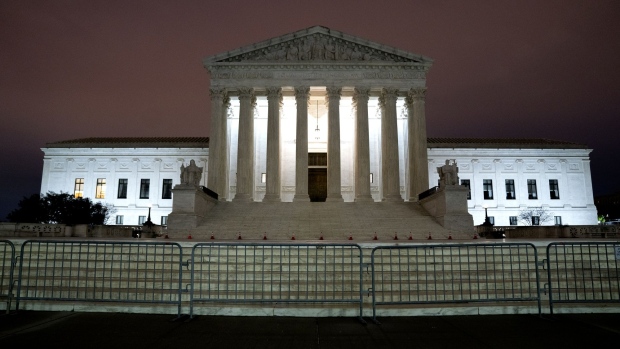Mar 22, 2022
In Cruz Spar, Jackson Sees Similar Hurdles as Previous Minorities
, Bloomberg News

(Bloomberg) -- Supreme Court nominee Ketanji Brown Jackson, the first Black female candidate to be considered for the job, faced a barrage of questions during her Senate confirmation hearing about critical race theory and whether it would influence her work as a justice.
The thorny exchange came from Republican Senator Ted Cruz, who asked the judge about her views on the New York Times Magazine’s 1619 Project, a series of articles looking at the history of the U.S. through the prism of slavery. Cruz, who was a year ahead of Jackson at Harvard Law School, also questioned her contention that she didn’t know whether critical race theory is part of the curriculum in U.S. schools. Jackson rebuffed the questions, replying: “It doesn’t come up in my work as a judge.”The exchange is part of a long history of such incidents. Analysis shows that female nominees often face a spike in questions related to judicial philosophy — or measures sometimes used to determine “competence to serve,” researchers have said.
For most Americans, the confirmation hearings are the only real opportunity to get to know eventual Supreme Court justices, said Paul Collins Jr., professor of legal studies and political science at the University of Massachusetts Amherst. But, research shows, it’s also an opportunity for bias to emerge.
An increase in questions over judicial philosophy is just one of the obstacles that faced women and minorities during previous hearings, according to analysis done by researchers at the University of Georgia School of Law and the University of Massachusetts. They also found that women often face more interruptions than male nominees, as do candidates of color. And all of that gets sharper along party lines, making “smooth, bipartisan confirmations” a “thing of the past,” according to analysts at the Brookings Institution.
“We have seen a pattern of judicial nominees of color, particularly women of color nominees, subjected to racist and sexist attacks,” Zinelle October, executive vice president at the American Constitution Society, said in an email before Jackson’s hearing began. “This includes nominees being repeatedly cut off and interrupted, and it includes grossly inappropriate questions and comments that misstate or mischaracterize a nominee’s career and experience.”
That behavior demeans “the Senate and this important and constitutional process," October said.
Some justices currently on the bench have spoken out about the confirmation process overall. Last month, Sonia Sotomayor spoke out about increasing partisanship in the process. In a 2017 speech at Arizona State University, Sotomayor acknowledged that negative comments during her confirmation process were hurtful. Elena Kagan in 2013 called the process “sort of broken” and “political theater.”
Here’s what researchers have learned looking at the tenor of previous proceedings.
Interruptions
An analysis of U.S. Supreme Court confirmation hearings done by researchers at the University of Georgia and the University of Massachusetts Amherst found that female and racial-minority nominees “received a higher percentage of interruptions” than their White, male counterparts.
The researchers reviewed transcripts of each of the hearings, coding exchanges where one speaker interrupted another to create a statistical picture. The analysis started with 1939 — the Felix Frankfurter became the first nominee to take unrestricted questions in an open, transcribed, public hearing — and went through 2010.
Women who appeared before the judiciary committee are interrupted in 12% of their statements, compared with 6.7% for men, the study found. Minority nominees were interrupted 9.3% of the time, compared with 7.4% for White nominees. The gaps become even wider when the senator asking the question is from the opposite party of the President who tapped the nominee.
“We actually dug deep and coded the interruptions, because not all interruptions are created equal,” said Collins, one of the researchers. “These are interruptions that are intended to take over the conversational floor.”
These types of interruptions can have the effect of throwing a nominee off, or making them appear as not forthcoming, the study showed.
During Kagan’s hearing, one exchange on foreign law cited by researchers showed she was interrupted three times by former Senator Tom Coburn. All told, Kagan had more than 18% of her statements cut short or talked over.
Read more: Biden Picks Jackson for Supreme Court, Putting Her on a Path to History
To update their findings, the researchers have also looked at the confirmation hearings of the three newest justices, Amy Coney Barrett, Neil Gorsuch and Brett Kavanaugh, who went through one of the most controversial processes in recent memory. They found that the trends hold up, Collins said.
Barrett was interrupted more than White, male nominees. The interruptions were more frequent from Democrats, who already opposed a nominee of Republican President Donald Trump.
The researchers will be rolling out their latest findings in full after Jackson's hearing, Collins said.
Judicial Questions
A separate look at confirmation hearings by Collins and his colleagues for the same 1939 to 2010 period showed a spike in questions related to judicial philosophy for female nominees — or how to interpret the U.S. Constitution.
Looking at instances when the senator asking the question was from the opposite party of the nominating president, questions on judicial philosophy were roughly double the amount for female nominees than male candidates.
“The fact that female nominees are very publicly subjected to a different type of confirmation process by male senators than are male nominees serves to perpetuate negative stereotypes that male judges are more believably prepared to serve in the judiciary and, specifically, as Supreme Court justices,” the study said.
Read more: Jackson's Path to Court Topples 233-Year Barrier for Black Women
Candidates of color can face similar scrutiny. Thurgood Marshall, the first Black justice on the court, faced “an elaborate attack” on his ability to understand and interpret the 14th amendment, the research shows. Disputes over interpretation of the amendment, which grants citizens “equal protection” under the law, has figured into some of the biggest Supreme Court cases since, including Roe v. Wade and decisions related to race-based school admissions.
In an article he wrote last month, Ted Johnson, director of the fellow program at the non-partisan law and policy institute Brennan Center for Justice, said that while Jackson's hearings may have “dramatic moments, race and gender are more likely to figure into the proceedings in subtler ways.” Johnson highlighted a 2011 paper by Collins and law professor Lori Ringhand concluding that women and minorities that go through the confirmation process face a different environment than their male peers.
Senators “tended to put aside the cordial chatter more quickly” and they “focus more intently on the nominee’s judicial philosophy and positions on civil rights and criminal justice," Johnson wrote.
Still, partisanship also plays a big role in how a nominee is treated, Johnson said in a phone interview.
“The harsher questions, the interruptions, they usually are posed by a senator from the party that is opposite the ideology of the person seeking confirmation,” he said. “So it's not just strictly the gender and color of the person seeking confirmation, but also the party of the person that is posing the question.”
During Barrett’s confirmation, some of her toughest grilling came from Senator Dianne Feinstein. The California Democrat questioned Barrett’s Catholic faith in her 2020 hearing, saying “The dogma lives loudly within you.”
Continued Bias
Even after being confirmed, female justices can continue to face bias.
Tonya Jacobi, professor of law at Northwestern Pritzker School of Law, performed an in-depth analysis of oral arguments made during terms when there were women on the bench. Her research found that judicial interactions were “highly gendered, with women being interrupted at disproportion rates” by male colleagues, she said.
“This happens all the time, in the workplace, between boys and girls,” Jacobi said. “The shocking thing about the study is that even at the Supreme Court, where it’s very hierarchical and structured and there are specific rules saying not to things, it happens. It’s not that it’s unique in any way—it’s the fact that it’s the same as everywhere else despite those things.”
©2022 Bloomberg L.P.








